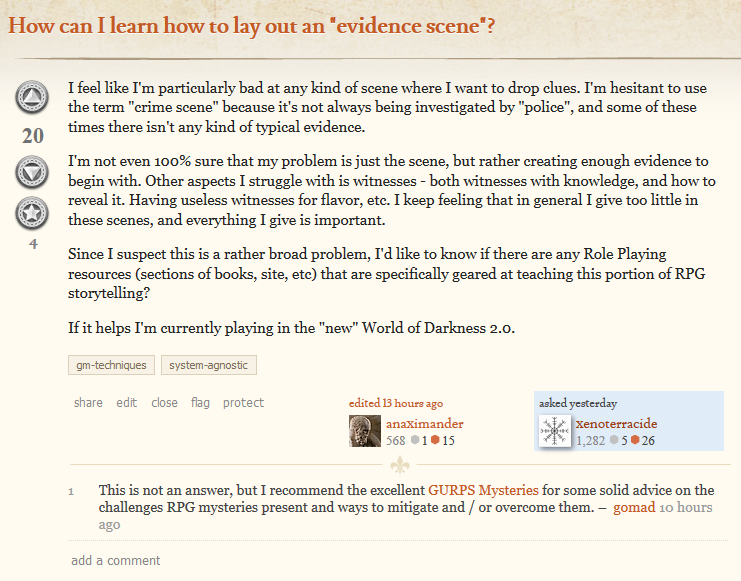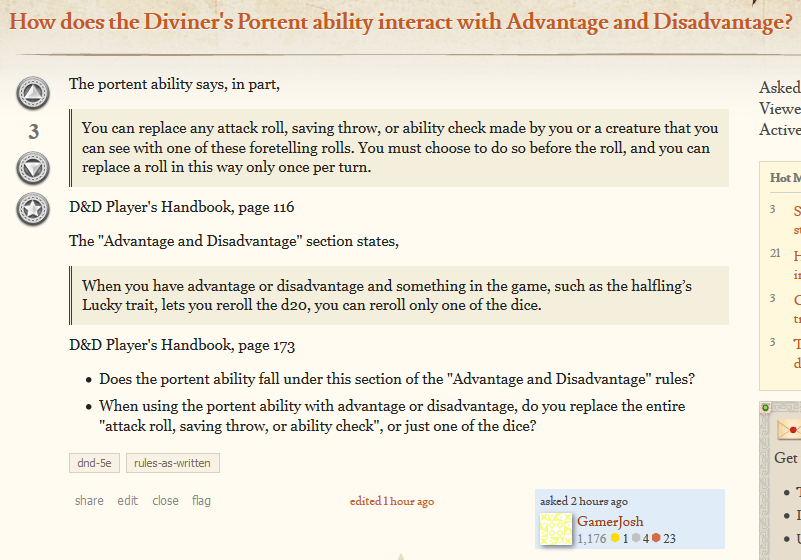We have some tags that seem to regularly get used such that they imply information about the post, which isn’t actually stated in the post itself.
- our various system tags, including [system-agnostic]. The asker will very often just tag with their system, and not mention it in tags or title.
- [rules-as-written], which comes with various rules like you have to stick to RAW interpretations and probably do citations.
These seem to be becoming a problem sometimes.
Not always! One of the standard uses of a system tag is to ask about a game’s mechanic, then use, say, the [dnd-3.5e] tag as the only definitive indication of what game you’re actually playing. This goes smoothly enough.
But it does lead to some problems in some cases.
1. Tagging multiple systems when their relationship is unclear
We’ve got this convention of describing the system only in the tags, right? This causes some problems in questions tagged with a mixture of [dnd-3e] [dnd-3.5e] and [pathfinder], though. Consider this question:
This involves D&D 3e and 3.5e somehow. But how? This question is explicitly interested in material from both editions, but what about 3e features which have been explicitly altered in 3.5e? This information isn’t specified the question.
The same author later asked a second question that did specify the important information in the question - they say at the end what systems they’re using how, and give meaning to the tags:
(To be doubly clear, this screenshot is an example of good behaviour, not problematic behaviour.)
2. Non-system agnostic system agnostic questions.
Following the trend that system tags don’t need to correlate strictly to question content, there is an often-arising type of question: one that is tagged [system-agnostic], and which says: “If it helps, I’m playing in {system}”. As an example:
What does the [system-agnostic] tag mean here, truthfully? If we specify solutions that don’t work in NWOD 2e, we do not provide a valid answer to the querent’s problem. I retagged this particular question, put the last sentence at the beginning (and rewrote it), and left a comment:
This kind of situation is why I brought up Should I use a narrow system tag, or go broad if possible and use system-agnostic? a while ago, to verify if this stance made any sense and had the community’s support.
3. Rules as written questions, where RAW constraints aren’t described
We get a lot of questions that specify they have certain rules constraints, e.g. “please cite your answer so I can show those rules in the book to my GM.” Or, “please stick to RAW, I’m not interested in interpretations.”
However, sometimes we’ll get a question that asks how certain mechanics work, then just has a [rules-as-written tag]:
But what does the tag mean in this case? What rules-as-written constraints does the asker have? Answerers get bitten, because other readers interpret the rules-as-written tag to mean various things not described in the question, and when it’s a new user, they’d have no idea anyway:
Should we do something? If so, what?
I hope I’ve at least conveyed that there’s a problem arising regularly, and some of you have probably run into these situations multiple times before.
Part of the problem is that I generally don't see these cases acted on, so the questions will still be in this state months later (if this wasn't the case I wouldn't be raising this question).
Is this enough of a problem we need to change things? If so, what should change?
Previous discussions on [system-agnostic]: Is [system-agnostic] a meta tag? / Is the "system-agnostic" tag really necessary? / Do we need the System-Agnostic Tag? / Does the [system-agnostic] tag conflict with system specific tags?
And on [rules-as-written]: Reviewing the usefulness of type-of-answer tags / What are the Pros and Cons of the rules-as-written tag?






